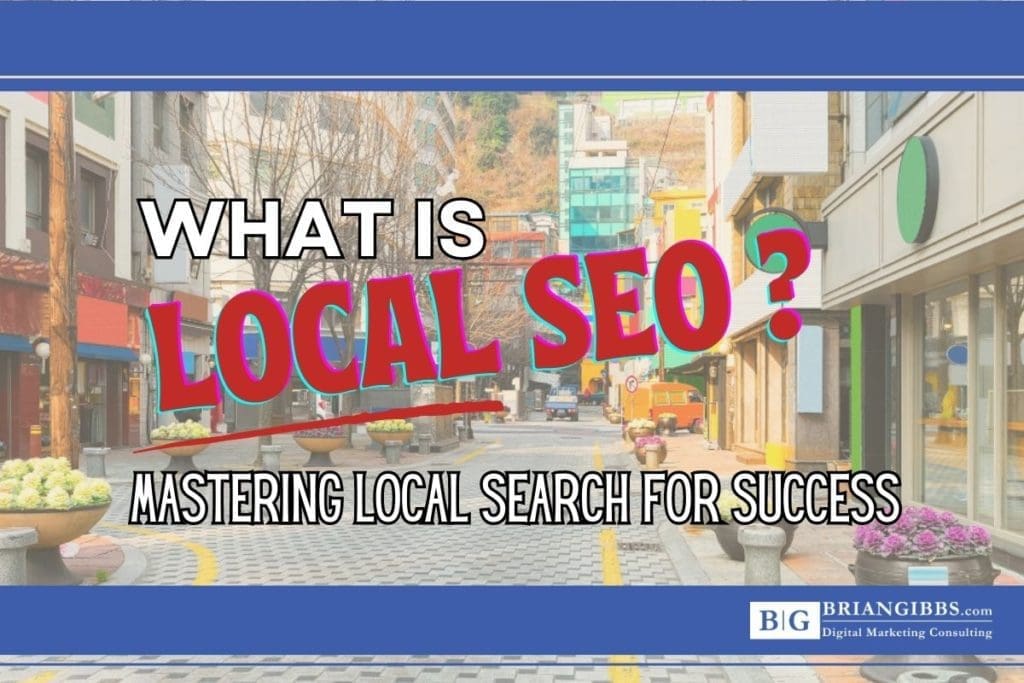What is Local SEO? Mastering Local Search for Success
TL;DR:
Understand local SEO for better visibility in local searches. Optimize with keywords, Google My Business, and reviews. Emphasize relevance, authority, and user experience. Leverage location-specific tactics to target local customers. Stay ahead with continuous optimization and follow Google’s guidelines. Boost your online presence for success in today’s digital world.

What is Local SEO? Mastering Local Search for Success
Confused about local SEO? You’re not the only one! Many businesses are having difficulty understanding how to optimize their website for local searches. Don’t feel overwhelmed! We will explain local SEO and helpful tips to help you start.
What Is Local SEO?
Local SEO is a must for online marketing. It focuses on boosting a website’s visibility in local search results. Strategies and techniques are used to draw relevant local customers to the business’s website. This boosts the business’s online presence and helps them reach potential customers in their target area.
When it comes to local SEO, there are practices that can improve rankings. These include:
- Optimizing the website with relevant keywords
- Optimizing Google My Business listings
- Managing online reviews and ratings
- Building citations from authoritative local directories
- Implementing structured data markup
The emphasis on location-based searches is one unique aspect of local SEO. By optimizing for location-specific keywords, businesses can target customers in their area. This is great for brick-and-mortar stores that want to draw in foot traffic.
Rules for local SEO may vary according to the industry and location. Keeping up with trends and algorithm updates is vital for a successful local SEO strategy.
Moz reports that 50% of consumers who do a local search on their phones visit a store within a day. That’s why local search is like finding hidden treasure. Except this treasure brings more customers instead of gold doubloons.
Why Local Search Is Important

Zooming in on Local Businesses: The Power of Local Search.
Local search is essential for businesses to succeed in today’s digital world. It lets them reach potential customers in their area, making them more visible and bringing in foot traffic. Optimizing their online presence allows them to show up in relevant local search results and stand out from the competition.
Mobile devices and voice search tech are becoming more popular. Consumers depend on local search engines like Google Maps or Yelp to find nearby restaurants, plumbers, and hair salons. Businesses can use local SEO strategies to place at the top of these localized results. This involves optimizing their website content with keywords, having consistent info across listings, and getting good customer reviews.
Local search is also key for physical stores competing with online retailers. Even though e-commerce is convenient, many people still prefer shopping locally because they want to support small businesses and experience products for themselves. Showing up in local search results helps physical stores attract customers who want the personal touch and instant gratification.
Interesting fact: local search impacts holiday shopping trends. Studies show that more shoppers use local search engines to find stores with specials or limited edition items during the festive season. Businesses that don’t optimize their online presence miss out on attracting these holiday shoppers.
How did search engines evolve?

From Basics to Brilliance: The Timeline of Search Engine Evolution.
Search engines have evolved greatly. In the beginning, they simply listed websites based on their content and relevance. As the internet grew, so did the need for more advanced algorithms. Keywords, link popularity, and other factors were incorporated into the ranking system.
Google took it a step further with its PageRank system. It looked at the quality and quantity of links to determine a website’s value.
This evolution has continued. Technologies and user behavior have been taken into account. Personalization of search results based on individual preferences and data is now possible. Local SEO strategies have been implemented too. Google Maps integration and localized search results are just two examples.
Need to stay ahead? Businesses should optimize their websites for local SEO. This includes including relevant keywords, location-specific content, and consistent business listings across directories.
So how does Google work? It’s like finding a needle in a haystack – except the haystack is the internet, and the needle is your website.
So how does Google work?

Decoding Google: The Intricate Mechanics Behind the World’s Leading Search Engine.
Google, the world’s most popular search engine, works using a complex algorithm to decide how websites appear in search results. This algorithm is continually changing and looks at a variety of factors to offer relevant content to users. A major part of Google’s functioning is its capability to explore and sort web pages.
Google employs automated programs, called crawlers or bots, to investigate web pages across the internet. These bots track links from one page to another, collecting info about each page they find. The bots evaluate the content on these pages, including videos, images, HTML code, and text.
After the crawlers have collected this data, it is stored in Google’s massive index. This index allows Google to quickly locate the right results when someone enters a search query. The indexing process involves organizing and categorizing web pages based off of their content and relevance.
When a user makes a search on Google, the search engine scans its index for web pages that match the search. It then applies its ranking algorithm to decide the order of the pages in the search results. The aim is to give users the correct and most helpful information possible.
If you want to make your website more visible on Google, here are a few tips:
- Improve your website’s content using related keywords that people are likely to search for. This will help Google understand your site.
- Make sure your website is mobile-friendly since more and more people use mobile devices to access the internet.
- Boost your website’s load speed because slow-loading sites can cause higher bounce rates.
- Create high-quality backlinks from reliable websites, as this can increase your website’s trustworthiness in Google’s eyes.
- Frequently update your website with fresh and valuable content to make it interesting and current.
By following these tips, you can improve your website’s visibility on Google. Always remember that Google’s priority is to give users the best possible search experience, so creating high-quality content will help your website’s visibility in the long run. Trying to comprehend how Google ranks search results? It’s like trying to figure out the secret recipe for Coca-Cola while wearing a blindfold and juggling flaming swords!
How Google ranks search results

Google ranks search results using a complex algorithm.
Google ranks search results using a complex algorithm. It takes into account factors like relevance, authority, and user experience of a website. Let’s take a look at how Google decides what to show on its SERP (Search Engine Results Page).
Relevance:
- Content: Quality content that answers the user’s query is important.
- Keywords: Including relevant keywords helps Google understand the webpage.
- Meta tags: Optimizing meta tags with keywords boosts relevancy.
Authority:
- Backlinks: High-quality backlinks from reputable sites show authority.
- Social signals: Social media shares/engagement indicate authority.
- Brand presence: Establishing a strong brand presence online increases perceived authority.
User Experience:
- Page speed: Fast-loading websites provide a better experience.
- Mobile-friendly design: Having a mobile-friendly site is essential for UX.
- Easy navigation: Good organization and easy navigation improve user experience.
Google has kept its core principles consistent as it has evolved over time. By improving relevance, authority, and user experience, you can increase your chances of ranking higher in search results.
Google is always trying to refine the search experience for its users. Its local ranking algorithm is like the Hunger Games, pitting businesses against each other to see who gets the spotlight.
How Google Determines Local Ranking
Google’s local ranking depends on various factors, such as relevance, distance, and prominence. Relevance means how well a local listing fits the search query. Distance is worked out based on the searcher’s location or one they specify. Prominence has to do with how well-known or popular a business is.
Let’s check out this table:
| Factors | Description |
|---|---|
| Relevance | How well a local listing matches the search query |
| Distance | Calculated based on the user’s location or specified location in the search |
| Prominence | Relates to the popularity and reputation of a business |
Although these three are vital for local ranking, there are more specifics that contribute. These include reviews online, citations from reliable sources, and information being consistent across platforms. Following Google’s guidelines and continuously optimizing your online presence can also have a positive impact on local ranking.
You must know the latest trends and techniques to take advantage of local SEO and be more visible on Google. You can raise your prominence factor by keeping your info accurate and engaging with customers through reviews and responses.
Don’t miss out on customers due to bad local ranking. Stay on top of managing your online presence, and make sure you meet Google’s criteria for ranking higher in local searches. Focus on relevance, distance, prominence, and best practices for local SEO, and you may get more customers. Local SEO is like finding a hidden treasure in your backyard, except the treasure is customers, and the backyard is the internet.
Local SEO is a Different Pattern

Piecing Together the Local SEO Puzzle: A Unique Approach to Visibility.
Local SEO is a unique approach to search engine optimization. It focuses on local businesses to help them gain visibility online and attract foot traffic to their physical stores. It is distinct from traditional SEO, which aims to rank high on global search results.
With Local SEO, you use location-specific keywords and target localized link-building opportunities. This optimizes website content, manages online reviews, and ensures accurate business information across various platforms.
For brick-and-mortar establishments, Local SEO is essential. It gives them an advantage over competitors in the local market. Not optimizing for local searches means missing out on potential customers nearby. Businesses need to embrace Local SEO for success in today’s digital world.
What matters for local SEO? Google is the judge, jury, and executioner of your online presence!
What matters for local SEO
When it comes to boosting local SEO, there are several elements that matter. A major one is to optimize your Google My Business listing by giving accurate and up-to-date details about your business. This includes your business name, address, phone number, website URL, and category.
Another essential factor is to make sure your website is optimized for local search. This can be done by having relevant keywords in meta tags, headings, and content. It’s also important to have a mobile-friendly website that loads quickly and gives a smooth user experience.
Plus, building high-quality backlinks from local directories and reliable websites can significantly enhance your local SEO rankings. These backlinks help search engines acknowledge the authority and reliability of your website.
To further increase your local SEO efforts, motivate reviews from contented customers on platforms such as Google My Business, Yelp, or Facebook. Positive reviews not only enhance your online reputation but also contribute to increasing your visibility in local search results.
Local SEO vs. SEO – What’s the Difference?

Local vs. Global SEO Require Different Strategies.
Local SEO and SEO seem similar but have distinct differences. Let’s take a look at them side-by-side:
Local SEO | SEO
- Targets local audience | Targets global audience
- Focuses on optimizing Google My Business | Primarily focuses on website optimization
- Emphasizes customer reviews and ratings | Concentrates on backlink building
- Utilizes local keywords and location data | Uses broad keywords extensively
Let’s delve into the details. Local SEO is great for businesses with physical stores, as it prioritizes local search results for users near them. On the other hand, traditional SEO focuses on global visibility and ranking.
If you want to boost your local search rankings, here are some tips:
- Optimize your Google My Business listing.
- Encourage customers to leave reviews.
- Use local keywords with geographical identifiers.
- Keep your NAP (Name, Address, Phone Number) consistent across platforms.
By applying these strategies, you can increase your local search visibility and draw in more relevant customers. It’s not just about being seen; it’s about being found by loyal customers. So, utilize local SEO to boost your business!
Improving Your Local Search Presence

Blasting Off in the Local Digital Space: Tactics to Elevate Your Local Presence.
Want to give your rivals a run for their money? Let’s leverage local SEO to take your corner of the web by storm! Here are three key tactics to boost your local SEO:
- Optimize Google My Business listing: Double-check your business NAP (Name, Address, Phone Number) details, categories, and descriptions. Also, keep business hours up-to-date and respond quickly to customer reviews.
- Get local citations: Get listed on well-known online directories like Yelp and Yellow Pages. Make sure NAP is consistent, and the info is accurate across all platforms.
- Generate positive reviews: Ask satisfied customers to leave reviews on websites like Google, Facebook, or TripAdvisor. These reviews upgrade SEO, generate trust, and sway potential customers.
Plus, throw in location-specific keywords on your site content to boost local search results. Don’t forget to be active on social media too! Interact with your followers by sharing relevant content, engaging with them, and responding to queries quickly.
Start Harnessing SEO
SEO has two important parts: keyword research and on-page optimization. Find relevant search terms your target audience uses, then optimize your site content around them. Place keywords in titles, meta descriptions, and headings to make search engines understand your website. Off-page optimization is also important. Build high-quality backlinks to get better rankings.
Here’s an example of local SEO working. A small bakery in a suburban area had no customers. They used location-specific keywords and created a Google My Business profile. Soon, their bakery was appearing at the top of local search results. Foot traffic and sales shot up!
Don’t wait – start leveraging SEO today. With the right techniques and efforts, you can be ahead of the competition and attract more visitors to your website.
Conclusion
In the ever-evolving landscape of digital marketing, it’s not just about having an online presence; it’s about making sure the right folks in your neighborhood can find you when they’re looking for what you offer. This guide has taken us on a journey, highlighting the ins and outs of standing out in our own communities. With so many of us pulling out our phones to quickly find that nearby cafe or trusted local mechanic, it’s more important than ever for businesses to be on top of their local game. It’s not just about global reach anymore; it’s about being a local hero. So, let’s dive in, fine-tune our strategies, and ensure our brands are visible and truly memorable in our backyards.
Frequently Asked Questions
What is local SEO?
Local SEO, or local search engine optimization, refers to the process of optimizing a website and its content to improve its visibility and rankings in local search results. It focuses on attracting customers in a specific geographical location and driving traffic to brick-and-mortar businesses.
Q: Why is local SEO important?
A: Local SEO is crucial for businesses that rely on local customers. It helps them appear in relevant local search results, increases their online visibility, drives targeted traffic, and improves the chances of attracting potential customers ready to purchase.
How does local SEO work?
A: Local SEO involves various strategies and techniques to optimize a website for local search. This includes creating and optimizing Google My Business listings, targeting local keywords, obtaining positive reviews, improving website loading speed, and ensuring consistency in NAP (name, address, phone number) information across online directories.
What are the benefits of local SEO?
A: The benefits of local SEO include higher visibility and rankings in local search results, increased website traffic, improved brand awareness among local customers, higher chances of conversion, and staying ahead of the competition in the local market.
How long does it take to see results from local SEO efforts?
A: The time taken to see results from local SEO efforts can vary depending on various factors, such as the competitiveness of the local market, the website’s existing optimization, the effectiveness of the SEO strategies implemented, and search engine algorithm updates. Generally, noticeable improvements can be seen within a few months.
Do I need a professional to handle my local SEO?
A: While handling basic local SEO tasks yourself is possible, working with a professional local SEO agency or expert can ensure more effective and efficient results. Professionals have extensive knowledge and experience in local SEO best practices and can provide customized strategies to meet your business goals.

